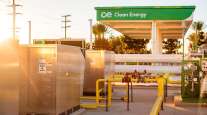Managing Editor, Features and Multimedia
Favorable Economics Seen Boosting Natural Gas as Trucking Fuel
ARLINGTON, Va. — The trucking industry’s adoption of natural gas vehicles will be driven by favorable economics made possible by a vast domestic supply of the fuel, natural gas producers and advocates said Thursday at a conference examining the fuel’s potential for transportation, hosted by American Trucking Associations.
ATA Chairman Michael Card, president of Combined Transport, Central Point, Ore., said in his opening remarks at the Summit on Natural Gas in Trucking that the trucking industry — which has been wedded to the use of diesel fuel for more than half a century — is now “experiencing firsthand what might become a game-changer regarding the types of fuel fleets may use to deliver the nation’s freight.”
“Given the rapid technological advancements in natural-gas extraction methods and vehicle technologies, coupled with exceedingly attractive pricing, we are truly on the cusp of a potentially revolutionary change in the trucking industry,” Card said.
While some fleets may make their fuel decisions based on a desire to reduce America’s dependence on foreign oil, or to cut greenhouse gases or urban pollution, “the other 99%” will make that choice based on economics, said Richard Kolodziej, president of NGVAmerica.
With natural gas selling at about the equivalent of $28 per barrel of crude oil, that translates to savings of $1.50 to $2 per gallon at the pump, said Kolodziej, who gave a “Natural Gas 101: A Primer” presentation at the summit.
Kolodziej, whose organization seeks to promote the development of a market for natural gas-powered vehicles in the United States, said that while natural-gas vehicles cost more to buy or convert than those using traditional fuels, they cost much less to operate.
Carriers can recover the higher purchase price of natural-gas equipment “pretty quickly if you’re a big trucker and you’re using a lot of fuel,” he said. “All forecasts are predicting that natural gas will stay at a very, very reasonable price through the next 20 to 30 years.”
The economics, the availability of natural-gas vehicles, the expanding fueling infrastructure and public policy have all “lined up for us now like never before,” Kolodziej said. “This is going to be the diesel fuel of the future.”




